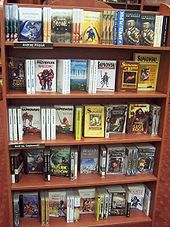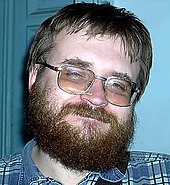Science fiction and fantasy in Poland
You can help expand this article with text translated from the corresponding article in Polish. Click [show] for important translation instructions.
|

Science fiction and fantasy in Poland dates to the late 18th century. During the latter years of the
. Later, many other genres gained prominence.Poland has many science-fiction writers. Internationally, the best known Polish science-fiction writer is the late Stanisław Lem. As elsewhere, Polish science fiction is closely related to the genres of fantasy, horror and others.
While many English-language writers have been translated into Polish, relatively little Polish-language science fiction (or fantasy) has been translated into English.
History
This section needs additional citations for verification. (April 2012) |
Science fiction in Poland started in the late 18th century during the
In the early 20th century,
After

In the late 1970s, the genre
The 1980s were marked by the creation of the first Polish literary magazine dedicated to science fiction and fantasy, Fantastyka, later renamed to
The 1980s were also the time Polish comics dealing with fantasy and science fiction were released, such as The Witcher comic book, and the science fiction comic series Funky Koval.
After the
In the 1990s, there was an explosion of translations, primarily from the Western (English language) literature. The major Polish publishing house specializing in Polish science fiction and fantasy literature was
Currently, much of Polish science fiction and fantasy resembles that familiar to English-language writers. There are many
Modern writers





Modern Polish science fiction and fantasy writers include:
- Ewa Białołęcka[1]
- Anna Brzezińska:[1] one of the youngest Polish writers, known for her ongoing fantasy saga, the first book of which (Zbójecki Gościniec) was released in 1999.
- Eugeniusz Dębski:[1] a writer of fantasy and science fiction, best known for two series—the science fiction detective stories of Owen Yeates and the humorous adventures of a 'chameleon knight', Hondelyk.
- hard sf; popular themes include the technological singularity, nanotechnology and virtual reality. Among his favourite writers is Australian Greg Egan, and Dukaj's books bear some resemblance to Egan's.
- Jarosław Grzędowicz:[1] author of fantasy stories, winner of Zajdel award for book and short story in 2005.
- Fantastyka
- Anna Kańtoch
- Tomasz Kołodziejczak:[1] science fiction and fantasy writer, screenwriter, publisher and editor of books, comics and role-playing games.
- humanisticaspects (psychology, feelings, motivations, etc.) of his characters.
- Maja Lidia Kossakowska:[1] a fantasy writer, her trademark is the frequent appearance of angels.
- Feliks W. Kres:[1] best known for his two fantasy cycles: Księga całości (The Book of Entirety), set on a world called Szerer, where cats and vultures as well as humans are intelligent, and Piekło i szpada (Hell and spade), a dark fantasy set in an alternate 17th century, where demons and beings older than Satan openly interact with humanity
- Jacek Komuda: known for his fantasy stories set in the Polish–Lithuanian Commonwealth; his writing often closely resembles a historical novel, though he doesn't shy from supernatural elements such as witches and devils. He is also one of the authors of the Dzikie Pola role-playing game set in that period.
- philosophical speculation on technology, the nature of intelligence, the impossibility of mutual communication and understanding, and humankind's place in the universe. His works are sometimes presented as fiction, to avoid the trappings of academic life and the limitations of readership and scientific style, while others take the form of essaysand philosophical books.
- Konrad T. Lewandowski[1]
- Łukasz Orbitowski
- Romuald Pawlak[1]
- Jacek Piekara[1]
- Michał Sędziwój, and the universe is the same as the one of Wędrowycz (who makes appearances from time to time).
- J.R.R. Tolkien, while also heavily influenced by Polish history and Slavic mythology.
- Jacek Sobota[1]
- Wit Szostak
- Cylinder van Troffa, they are outsiders from a different time or place, trying to adapt to a new environment. The main recurring theme in his works is a comparison of the readers' gloomy, hopeless situations to what may happen in a space environment if we carry totalitarian ideas and habits into space worlds: Red Space Republics or Space Labour Camps, or both. The Janusz A. Zajdel Award of Polish fandomis named after him.
- dystopian fiction.
- Andrzej Zimniak[1]
- Andrzej Ziemiański.[1] Ziemiański writes both science fiction—with themes like post-apocalyptic Autobahn nach Poznan and alternative history Bomba Heisenberga, and fantasy, like his most recent Achaja series.
Publishers
The major
There are two major Polish
Fandom
Polish
Literary awards
- Janusz A. Zajdel Award (briefly known as "Sfinks")
- Nautilus Prize
- Śląkfa, the award of the oldest Polish fandom club, the Silesian Fantasy Club.
- Sfinks Award, the award of the SFinks magazine
- Jerzy Żuławski Literary Award, founded in 2008 in honour of Jerzy Żuławski
Other media
Polish science fiction writing has not had much impact on non-print
In the late 2015s, The Witcher computer game series became a best-seller worldwide.
Notes
References
- An Overview of Polish Science Fiction & Fantasy, last accessed on 15 June 2006
- (in Polish) Historia polskiej literatury fantastycznej (History of Polish fantasy literature)
- "Zaczarowana Gra" (PDF) (in Polish). (176 KiB)—summary and review of book by Antoni Szmuszkiewiczwith the same title about history of Polish science fiction literature, published in 1982
